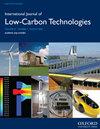大学生宿舍能源使用行为的影响因素研究:群体层面因素和时间因素
IF 2.3
4区 工程技术
Q3 ENERGY & FUELS
引用次数: 0
摘要
促进大学生宿舍节能行为有利于提高高校建筑的能效。由于同一宿舍的学生需要共享用能设备和费用,他们不可避免地会通过各自的用能行为相互影响,这种互动过程会随着与室友相处时间的增加而逐渐达到一定的稳定状态。然而,现有的能源使用行为影响因素研究往往侧重于个体的主观特征,而忽略了群体和时间因素的影响。因此,本文将人际关系和群体认同纳入计划行为理论,并将与室友相处的时间作为调节变量,构建大学生宿舍能源使用行为的影响因素模型。实证数据通过问卷调查768人收集,采用广义有序logit回归对研究模型进行分析。结果表明,影响学生能源使用行为的因素会随着与室友相处时间的增加而改变。当与室友相处的时间为0-1年时,人际关系、群体认同、舒适度、个人规范和环境问题是显著影响因素。当与室友相处1-2年,环境问题就不再有影响;然而,能源使用成本和能源使用习惯将被增加。当与室友相处的时间为2-3年时,人际关系、个人规范、群体认同、能源使用成本等不再有任何影响,但会增加主观规范。本文章由计算机程序翻译,如有差异,请以英文原文为准。
Research on the factors influencing college students’ energy-use behavior in dormitories: group-level factors and time factors
Promoting energy-saving behavior among college students in dormitories is conducive to improving the energy efficiency of college buildings. As students in the same dormitory need to share the energy-using equipment and expenses, they will inevitably influence each other by their energy-use behaviors, and this interaction process will gradually reach a certain stable state with the passing of the time spent with roommates. However, the existing research on the influencing factors of energy-use behaviors often focuses on individual subjective characteristics while overlooking the influence of group and time factors. Therefore, this paper incorporates interpersonal relationship and group identity into the theory of planned behavior, and considers the time spent with roommates as the moderating variable to build a model of factors influencing college students’ energy-use behaviors in their dormitories. Empirical data were collected by a questionnaire survey with 768 respondents, and generalized ordered logit regression was used to analyze the research model. The results reveal that the factors that influence students’ energy-use behaviors will change with the time spent with roommates. When the time spent with roommates is 0–1 year, interpersonal relationships, group identity, comfort, individual norms, and environmental concerns are significant influences. When the time spent with roommates is 1–2 years, environmental concerns will no longer have an effect; however, energy-use costs and energy-use habits will be added. When the time spent with roommates is 2–3 years, interpersonal relationships, individual norms, group identity, and energy-use costs will no longer have any influence, but subjective norm will be added.
求助全文
通过发布文献求助,成功后即可免费获取论文全文。
去求助
来源期刊

International Journal of Low-carbon Technologies
Engineering-Architecture
CiteScore
4.30
自引率
4.30%
发文量
106
审稿时长
27 weeks
期刊介绍:
The International Journal of Low-Carbon Technologies is a quarterly publication concerned with the challenge of climate change and its effects on the built environment and sustainability. The Journal publishes original, quality research papers on issues of climate change, sustainable development and the built environment related to architecture, building services engineering, civil engineering, building engineering, urban design and other disciplines. It features in-depth articles, technical notes, review papers, book reviews and special issues devoted to international conferences. The journal encourages submissions related to interdisciplinary research in the built environment. The journal is available in paper and electronic formats. All articles are peer-reviewed by leading experts in the field.
 求助内容:
求助内容: 应助结果提醒方式:
应助结果提醒方式:


